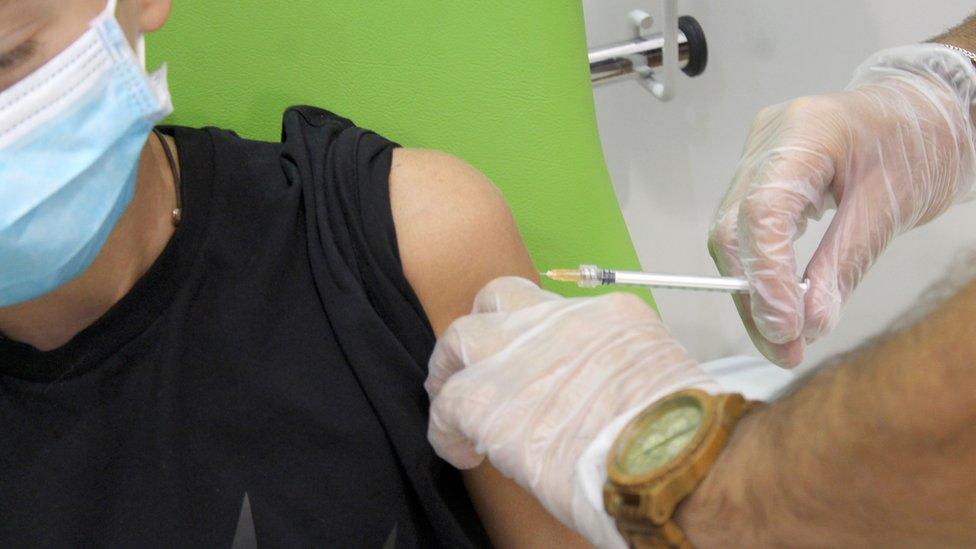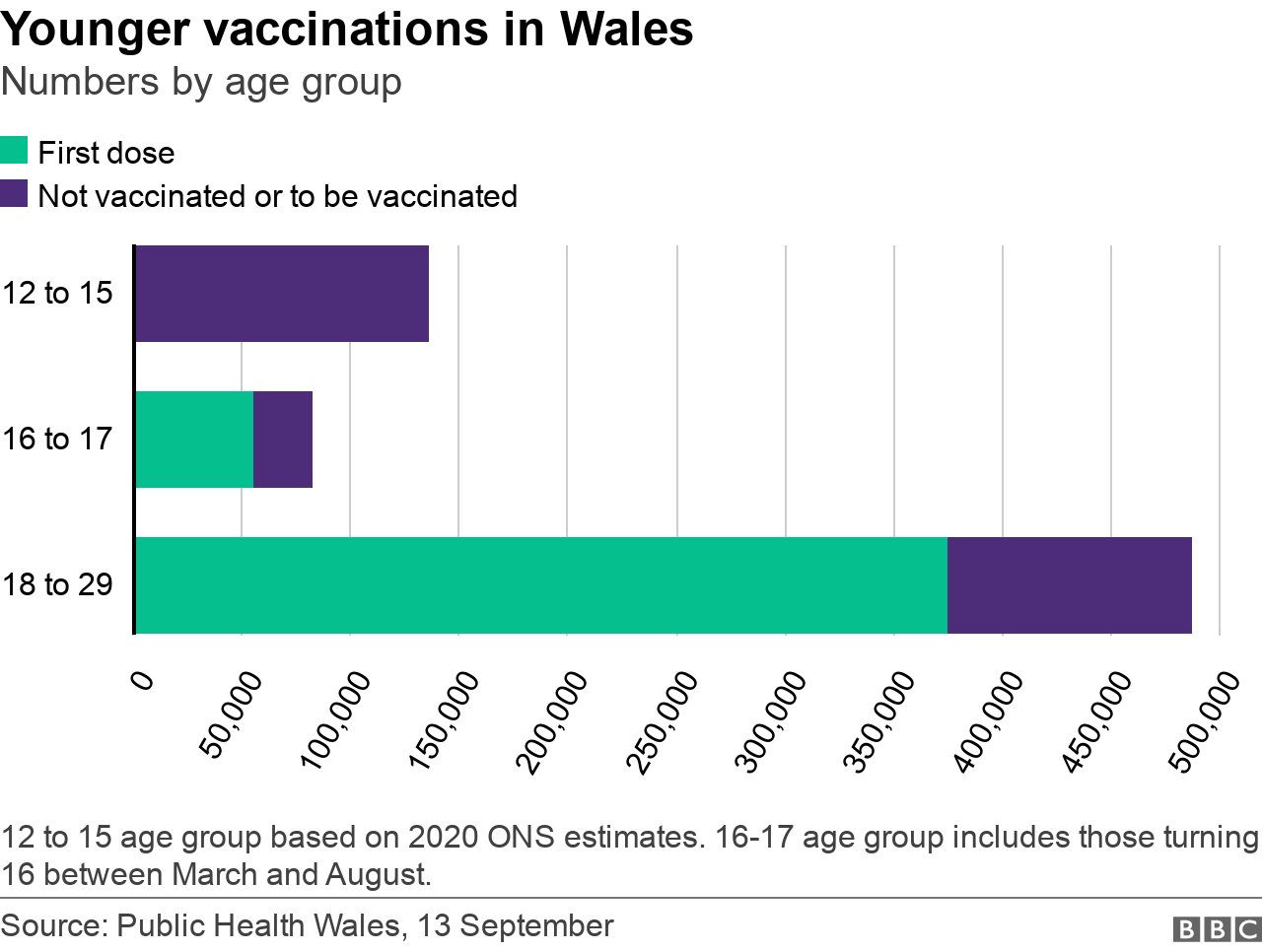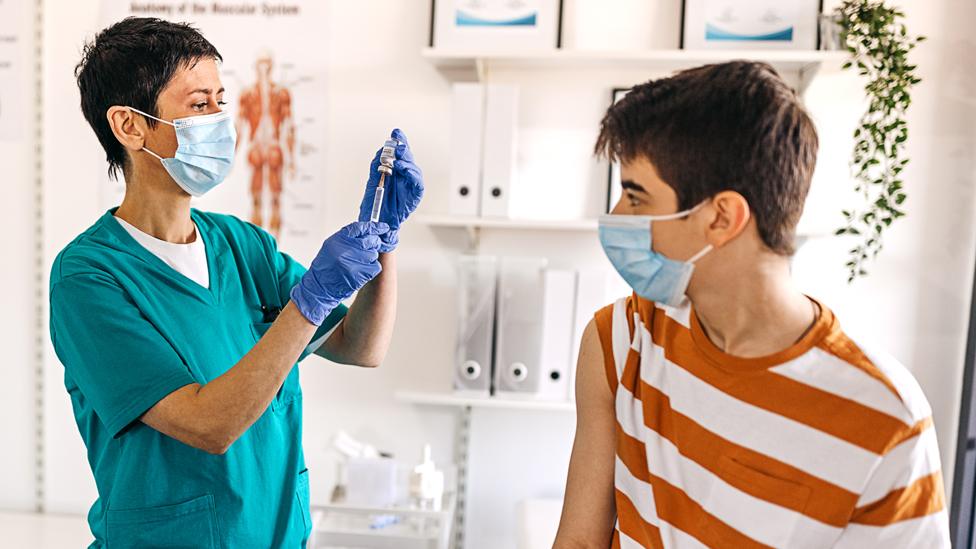Covid jabs for 12 to 15-year-olds 'for children and parents to decide'
- Published

Jabs are now being recommended for 12-15 year olds
Wales' top doctor has recommended that children aged 12 to 15 should get one dose of a Covid jab.
But Chief Medical Officer Dr Frank Atherton said the choice to do so was ultimately down to the young people and their parents.
Dr Atherton was one of four UK medical chiefs who have recommended ministers go ahead with the jabs.
He said it was now for children in the age group to speak to their parents about having the jab.
It is expected the Welsh government will follow the advice, although no announcement was made on Monday.
The UK's chief medical officers (CMOs) have recommended that healthy children should be offered a single dose of the Pfizer-BioNTech vaccine.
Earlier the UK government's joint committee for vaccination and immunisation (JCVI) said there was not enough benefit to warrant it on health grounds alone - but they said ministers could take into account other factors.
The CMOs concluded this tipped the balance given the virus was going to keep spreading over the winter.
They advised that vaccination was "likely to reduce (but not eliminate) education disruption".
Speaking at a Downing Street press conference alongside chief medical officer (CMO) for England, Prof Chris Whitty, Dr Atherton said there were both health and education benefits from the jabs.
He told the press conference: "My message to the young people of Wales will be that your CMOs are recommending that you should be offered this vaccine just as your parents and your relatives, your older relatives have been.
"But ultimately, the choice is for you and your parents and it's for you to now have the conversation with your parents, with your guardians, about these issues."
He later added: "The simple point is that from a health benefit and from an education benefit, it's better to be vaccinated than to be not vaccinated. So I would be recommending it to the children and young people here in Wales."


A headteachers union warned officials against giving schools a role in the vaccination programme, saying school leaders were not "medical experts".
Laura Doel, director of NAHT Cymru, said: "Asking them to become involved in complex conversations around topics such as consent is inappropriate and could leave them stuck between a rock and a hard place in appeasing parents, pupils, and executing their national duty."
Dr David Tuthill, of the Royal College of Paediatrics and Child Health, said it had been a "difficult decision" for the bodies involved.
He said: "The effects of Covid in children generally aren't severe and they are very, very rarely life threatening, in contrast to the elderly population."
His group supports the vaccination of 12 to 15-year-olds: "I think it's important that if children and their parents want it, we should be able to give it."
'Right thing to do'
Plaid Cymru's health spokesperson Rhun ap Iorwerth said: "It makes sense to look at all the potential harms caused to young people by Covid, from the small risk of acute illness, to wider concerns about long Covid, and the impact of a long-drawn-out pandemic on their wellbeing and education.
"Ultimately it will be up to parents and their children to decide, but to give them the choice now is the right thing to do."
His Welsh Conservative counterpart, Russell George, argued booster jabs were a "far more logical priority", however, "that will prevent hospital admissions and, thus, the overwhelming of NHS Wales which we are seeing now and, of course, future restrictions".
The Welsh NHS is already delivering jabs to 16 to 17-year-olds - 68.2% have a had a first dose.
Meanwhile more than two thirds of 18 to 29-year-olds have been fully vaccinated with two doses.
The Welsh government said on Monday: "Welsh ministers will be carefully considering the advice received today from the four chief medical officers, alongside the earlier advice from the JCVI before deciding whether to proceed with a vaccination programme for 12 to 15-year-olds."
Related topics
- Published13 September 2021
